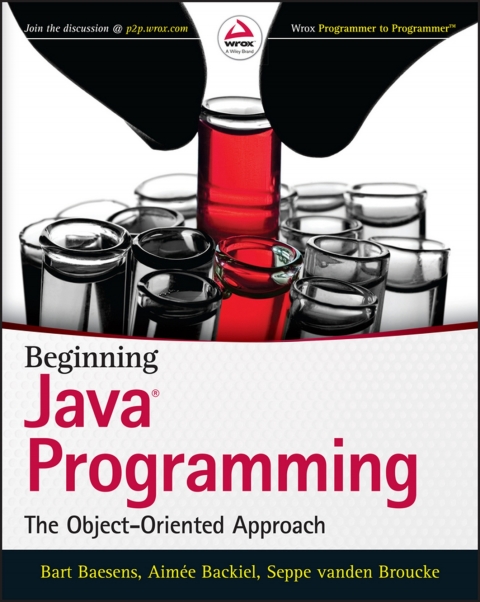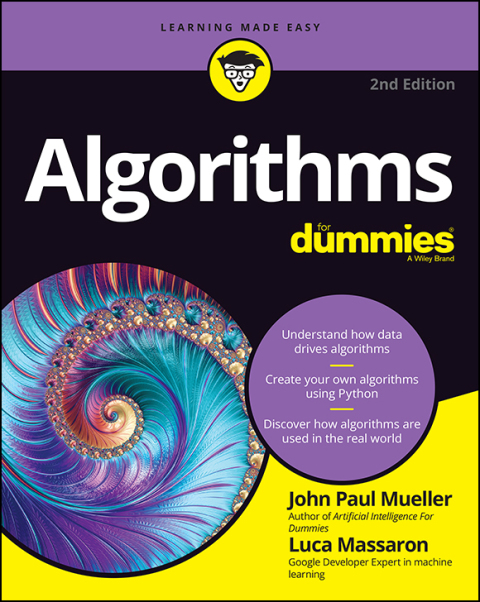Description
Efnisyfirlit
- Title Page
- Copyright
- Contents
- About the Authors
- Credits
- Acknowledgments
- Contents
- Introduction
- Chapter 1: A General Introduction to Programming
- The Programming Process
- Object-Oriented Programming: A Sneak Preview
- Programming Errors
- Syntax/Compilation Errors
- Runtime Errors
- Logic/Semantic Errors
- Principles of Software Testing
- Software Maintenance
- Adaptive Maintenance
- Perfective Maintenance
- Corrective Maintenance
- Preventive Maintenance
- Principles of Structured Programming
- Chapter 2: Getting to Know Java
- A Short Java History
- Features of Java
- Looking Under the Hood
- Bytecode
- Java Runtime Environment (JRE)
- Java Application Programming Interface (API)
- Class Loader
- Bytecode Verifier
- Java Virtual Machine (JVM)
- Java Platforms
- Java Applications
- Standalone Applications
- Java Applets
- Java Servlets
- Java Beans
- Java Language Structure
- Classes
- Identifiers
- Java Keywords
- Variables
- Methods
- Comments
- Naming Conventions
- Java Data Types
- Primitive Data Types
- Literals
- Operators
- Arithmetic Operators
- Assignment Operators
- Bitwise Operators
- Logical Operators
- Relational Operators
- Arrays
- Type Casting
- Summary
- Chapter 3: Setting Up Your Development Environment
- Integrated Development Environments
- Coding in Text Editors
- Choosing an IDE
- Eclipse
- NetBeans
- IntelliJ IDEA
- Continuing with One IDE
- Installing Eclipse on Your Computer
- Downloading and Installing Eclipse
- Using Eclipse
- Chapter 4: Moving Toward Object-Oriented Programming
- Basic Concepts of Object-Oriented Programming
- Classes and Objects in Java
- Defining Classes in Java
- Creating Objects
- Storing Data: Variables
- Instance Variables
- Class Variables
- Final Variables
- Variable Scope
- Defining Behavior: Methods
- Instance Methods
- Class Methods
- Constructors
- The Main Method
- Method Argument Passing
- Java SE Built-in Classes
- Classes in the java.lang Package
- Classes in the java.io and java.nio Packages
- Classes in the java.math Package
- Classes in the java.net, java.rmi, javax.rmi, and org.omg.CORBA Packages
- Classes in the java.awt and javax.swing Packages
- Classes in the java.util Package
- Collections
- Other Utility Classes
- Other Classes and Custom Libraries
- Chapter 5: Controlling the Flow of Your Program
- Comparisons Using Operators and Methods
- Comparing Primitive Data Types with Comparison Operators
- Comparing Composite Data Types with Comparison Methods
- Understanding Language Control
- Creating if-then Statements
- Nesting if-then Statements
- Creating for Loops
- What Is an Enhanced for Loop?
- Nesting for Loops
- Creating while Loops
- What Is a do while Loop?
- Comparing for and while Loops
- Creating Switches
- Comparing Switches and if-then Statements
- Reviewing Keywords for Control
- Controlling with the return Keyword
- Controlling with the break Keyword
- Controlling with the continue Keyword
- Specifying a Label for break or continue Control
- Reviewing Control Structures
- Chapter 6: Handling Exceptions and Debugging
- Recognizing Error Types
- Identifying Syntax Errors
- Identifying Runtime Errors
- Identifying Logical Errors
- Exceptions
- Common Exceptions
- Catching Exceptions
- Debugging Your Applications
- Using a Debugger Tool
- Using a Logging API
- Testing Your Applications
- Summary
- Chapter 7: Delving Further into Object-Oriented Concepts
- Annotations
- Overloading Methods
- The this KeyWord
- Information Hiding
- Access Modifiers
- Getters
- Setters
- Class Inheritance
- The Keyword super
- Method Overriding
- Polymorphism
- Static Binding
- Dynamic Binding
- The Superclass Object
- Abstract Classes and Methods
- Packages
- Interfaces
- Garbage Collection
- Chapter 8: Handling Input and Output
- General Input and Output
- Input and Output in Java
- Streams
- Byte Streams
- Character Streams
- Buffered Streams
- Data and Object Streams
- Other Streams
- Scanners
- Input and Output from the Command-Line
- Input and Output from Files
- Java NIO2 File Input and Output
- The Path Interface
- The Files Class
- Checking Existence
- Legacy File Input and Output
- A Word on FileUtils
- Conclusion
- Chapter 9: Working with Databases in Java
- Covering the Basics of Relational Databases
- Accessing Relational Databases from Java
- Java Database Connectivity (JDBC)
- SQLJ
- Ensuring Object Persistence
- Hibernate
- Object-Oriented Database Access from Java
- Comparing Java Database Access Technologies
- What’s Ahead
- Chapter 10: Accessing Web Sources
- A Brief Introduction to Networking
- Web Services
- RPC and RMI
- SOAP
- REST
- Accessing Web Services and Sources with Java
- Accessing SOAP Services
- Installing JAX-WS
- Accessing SOAP Services with JAX-WS Without WSDL
- Accessing SOAP Services with JAX-WS with WSDL
- Accessing REST Services
- Accessing REST Services Without Authentication
- Accessing REST Services with Authentication
- Screen Scraping
- Screen Scraping Without Cookies
- Screen Scraping with Cookies
- Creating Your Own Web Services with Java
- Setting Up an HTTP Server
- Providing REST Services
- Chapter 11: Designing Graphical Interfaces
- Covering the Basics of GUIs in Java
- Highlighting the Built-In GUI Libraries
- Abstract Window Toolkit (AWT)
- Swing
- Standard Widget Toolkit (SWT)
- JavaFX
- Other Toolkits and Libraries
- Choosing a GUI Library
- Building with Containers and Components
- Looking at the Full Picture
- Comparing Layout Managers
- FlowLayout
- BorderLayout
- GridLayout
- GridBagLayout
- CardLayout
- BoxLayout
- GroupLayout and SpringLayout
- Absolute Positioning (No Layout Manager)
- Understanding Events
- Introduction to Events
- Event Listeners
- On Threading and Swing
- Closing Topics
- Best Practices: Keeping Looks and Logic Separated
- Let’s Draw: Defining Custom Draw Behavior
- Visual GUI Designers: Making Life Easy?
- JavaFX: The Road Ahead?
- Chapter 12: Using Object-Oriented Patterns
- Introduction to Patterns
- Object-Oriented Patterns
- Creational Patterns
- Singleton Pattern and Static Utility Class
- Service Provider Pattern and Null Object Pattern
- (Abstract) Factory Pattern
- Structural Patterns
- Adapter Pattern
- Bridge Pattern
- Decorator Pattern
- Façade Pattern
- Composite Pattern
- Type Pattern and Role Pattern
- Behavioral Patterns
- Chain-of-Responsibility Pattern
- Observer Pattern and Model-View-Controller Pattern
- Iterator Pattern
- Visitor Pattern
- Template Method Pattern
- Strategy Pattern
- Helpful Libraries
- Apache Commons
- Google Guava
- Trove
- Colt
- Lombok
- OpenCSV
- HTML and JSON Libraries
- Hibernate and Other JPA-Compliant Libraries
- Joda-Time
- Charting Libraries
- 3D Graphics Libraries
- Financial Libraries
- Index
- Advert
- EULA







Reviews
There are no reviews yet.